|
|
|
Sort Order |
|
|
|
Items / Page
|
|
|
|
|
|
|
| Srl | Item |
| 1 |
ID:
153559
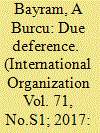

|
|
|
|
|
| Summary/Abstract |
Why are some politicians guided by a sense of obligation toward international law but others are not? Why do some politicians have a social as opposed to an egoistic preference over compliance with international legal rules? Existing approaches largely assume that the structural features of the compliance environment shape preferences. As a result, they neglect the heterogeneity across decision makers' subjective beliefs in the legitimacy of international law, which is critical for explaining who exhibits a sense of obligation and has a non-egoistic preference for compliance. Drawing upon a large body of psychological research on social identity and influence, I argue that obligation toward international law has a behavioral foundation shaped by cosmopolitan social identity. Using data from an original survey of German politicians that includes two compliance experiments, I show that politicians with a high degree of cosmopolitanism are driven by a sense of legal obligation that results in a social preference for compliance while those low on cosmopolitanism lack the same sense of normative respect. Replicated in a second experimental study conducted with a convenience sample, my results indicate that strategic rationality in compliance applies, but only to a particular set of actors. By illuminating the psychological underpinnings of obligation toward international law, this study contributes to a richer understanding of compliance preferences and builds a bridge between instrumental and normative models.
|
|
|
|
|
|
|
|
|
|
|
|
|
|
|
|
| 2 |
ID:
153561
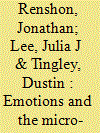

|
|
|
|
|
| Summary/Abstract |
While emotions are widely regarded as integral to the “behavioral approach” to International Relations (IR), a host of fundamental problems have delayed the integration of affective influences into traditional models of IR. We aim to integrate affect by focusing on commitment problems, a body of work that contains strong theoretical predictions about how individual decision makers will and should act. Across two lab experiments, we use a novel experimental protocol that includes a psychophysiological measure of emotional arousal (skin conductance reactivity) to study how individuals react to changes in bargaining power. While we find support for one key pillar of IR theory—individuals do reject offers when they expect the opponent's power to increase—we also find that physiological arousal tampers with individuals’ ability to think strategically in the manner predicted by canonical models. Our follow-up experiment mimics the elements of institutional solutions to commitment problems and finds support for their efficacy on the individual level. Our novel findings suggest that when individuals face large power shifts, emotional arousal short-circuits their ability to “think forward and induct backwards,” suggesting that emotionally aroused individuals are less prone to commitment problems.
|
|
|
|
|
|
|
|
|
|
|
|
|
|
|
|
| 3 |
ID:
153555
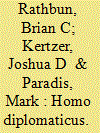

|
|
|
|
|
| Summary/Abstract |
Psychology is traditionally used in political science to explain deviations from rationality. Lost in the debate between rationalists and their critics, however, is a sense of whether the kinds of strategic self-interested behavior predicted by these models has psychological microfoundations: what would homo economicus look like in the real world? We argue that strategic rationality varies across individuals and is characterized by a pro-self social-value orientation and a high level of epistemic motivation. Testing our argument in the context of international relations, we employ a laboratory bargaining game and integrate it with archival research on German foreign policy-making in the 1920s. We find in both contexts that even among those interested in maximizing only their own egoistic gains, those with greater epistemic motivation are better able to adapt to the strategic situation, particularly the distribution of power. Our results build a bridge between two approaches often considered to be antithetical to one another.
|
|
|
|
|
|
|
|
|
|
|
|
|
|
|
|
| 4 |
ID:
153556
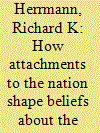

|
|
|
|
|
| Summary/Abstract |
If competing beliefs about political events in the world stem largely from information asymmetries, then more information and knowledge should reduce the gap in competing perceptions. Empirical studies of decision making, however, often find just the reverse: as knowledge and the stakes in play go up, the beliefs about what is happening polarize rather than converge. The theory proposed here attributes this to motivated reasoning. Emotions inside the observer shape beliefs along with information coming from the outside world. A series of experiments embedded in a national survey of Americans finds that a primary driver of the beliefs someone forms about globalization, other countries, and the politics in the Middle East is how strongly they attach their social identity to the United States. Attachment produces more intense positive and negative emotions that in turn shape the interpretation of unfolding events and lead norms to be applied in an inconsistent fashion. People, in effect, rewrite reality around their favored course of action, marrying the logic of appropriateness to their own preferences. Beliefs, consequently, are not independent of preferences but related to them. Motivated reasoning, while not consistent with rational models, is predictable and can lead to expensive mistakes and double standards that undermine liberal internationalism.
|
|
|
|
|
|
|
|
|
|
|
|
|
|
|
|
| 5 |
ID:
153563
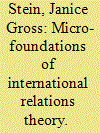

|
|
|
|
|
| Summary/Abstract |
Almost forty years ago, a small group of scholars drew on cognitive psychology to explain anomalous patterns of behavior by leaders on issues of international security. Although it made significant contributions to theory and research, that scholarship did not diffuse broadly into the field. Drawing on concepts in psychology and behavioral economics, research that uses new methods is now producing a wave of scholarship in international relations exemplified by the work in this special issue. Analysis of the use of prospect theory over the last three decades identifies the scope conditions that enable the predictions of rational choice and psychological theories. These scope conditions motivate the focus on the heterogeneity of decision makers that is at the core of current contributions. Future research will move beyond the now-sterile debate between rational choice and psychology.
|
|
|
|
|
|
|
|
|
|
|
|
|
|
|
|
| 6 |
ID:
153562
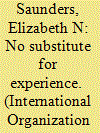

|
|
|
|
|
| Summary/Abstract |
Despite advances in the study of individuals in international relations, we still know little about how the traits and biases of individuals aggregate. Most foreign policy decisions are made in groups, usually by elites with varying degrees of experience, which can have both positive and negative psychological effects. This paper addresses the aggregation problem by exploring how the balance of foreign policy experience among leaders and advisers affects decision making in war, using a principal-agent framework that allows the relative experience of leaders and advisers to vary. A leader's experience affects decision making and, ultimately, the risks associated with conflict, through three mechanisms. First, experience influences a leader's ability to monitor advisers. Second, a leader's experience affects the credibility of delegation to experienced advisers and, in turn, the nature and extent of information gathering. Third, experience affects whether leaders are able to diversify advice, as well as their preference for policies that appear certain. I illustrate the argument using two cases that hold an unusual number of factors constant: the 1991 and 2003 Iraq Wars. George W. Bush's inexperience exacerbated the biases of his advisers, whereas his father's experience cast a long shadow over many of the same officials. Understanding the experience and biases of any one individual is insufficient—the balance of experience within a group is also important. Experience is therefore not fungible: a seasoned team cannot substitute for an experienced leader.
|
|
|
|
|
|
|
|
|
|
|
|
|
|
|
|
| 7 |
ID:
153564


|
|
|
|
|
| Summary/Abstract |
Behavioral IR faces a fundamental challenge. The actors in most IR models and theories are not individuals—they are aggregates like states, ministries, interest groups, political parties, and rebel factions. There are two broad approaches to attempting to integrate behavioral research about individuals. The first, a quasi-behavioral approach, makes nonstandard assumptions about the preferences, beliefs, or decision-making processes of aggregate actors. The second tries to build theories in which the key actors are individuals. Pursuing the former means that the assumptions about actors will be only weakly linked to the empirical findings propelling behavioral research. The second approach faces formidable obstacles that international relations theory has confronted for a long time and for the most part has not overcome.
|
|
|
|
|
|
|
|
|
|
|
|
|
|
|
|
| 8 |
ID:
153558
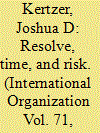

|
|
|
|
|
| Summary/Abstract |
Why do some actors in international politics display remarkable persistence in wartime, while others “cut and run” at the first sign of trouble? I offer a behavioral theory of resolve, suggesting that variation in time and risk preferences can help explain why some actors display more resolve than others. I test the theory experimentally in the context of public opinion about military interventions. The results not only help explain why certain types of costs of war loom larger for certain types of actors but also shed light on some of the behavioral revolution's contributions more broadly.
|
|
|
|
|
|
|
|
|
|
|
|
|
|
|
|
| 9 |
ID:
153560
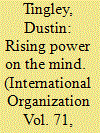

|
|
|
|
|
| Summary/Abstract |
A prominent explanation of war claims that international conflict can result when shifts in bargaining power induce the declining power to behave aggressively today because the rising power cannot credibly commit to not behave aggressively tomorrow. This paper asks whether individuals respond to shifting power in ways assumed by these models. Rather than use abstract laboratory-based bargaining games as in other work, I use vignettes describing the United States in an international bargaining situation to explore the microfoundations of power transitions models empirically. The vignettes vary whether the individual is a member of a declining or a rising power and whether there are previous public commitments to the status quo division of territory. Subjects propose a response the United States should make and then explain their decision in their own words. I apply new methods for analyzing these open-ended responses. Consistent with predictions from the behavioral literature, I find important asymmetries in behavior across these conditions as well as substantial heterogeneities in individuals' motivations for their decisions. The results of the experiments suggest potential ways that power-transition models should be refined to have a firmer behavioral basis.
|
|
|
|
|
|
|
|
|
|
|
|
|
|
|
|
| 10 |
ID:
153557


|
|
|
|
|
| Summary/Abstract |
The dominant approach to the study of international political economy assumes that the policy preferences of individuals and groups reflect economic self-interest. Recent research has called this assumption into question by suggesting that voters do not have economically self-interested preferences about trade policy. We investigate one potential explanation for this puzzling finding: economic ignorance. We show that most voters do not understand the economic consequences of protectionism. We then use experiments to study how voters would respond if they had more information about how trade barriers affect the distribution of income. We find that distributional cues generate two opposing effects: they make people more likely to express self-serving policy preferences, but they also make people more sensitive to the interests of others. In our study both reactions were evident, but selfish responses outweighed altruistic ones. Thus, if people knew more about the distributional effects of trade, the correlation between personal interests and policy preferences would tighten. By showing how the explanatory power of economic self-interest depends on beliefs about causality, this research provides a foundation for more realistic, behaviorally informed theories of international political economy.
|
|
|
|
|
|
|
|
|
|
|
|
|
|
|
|
|
|
|
|
|